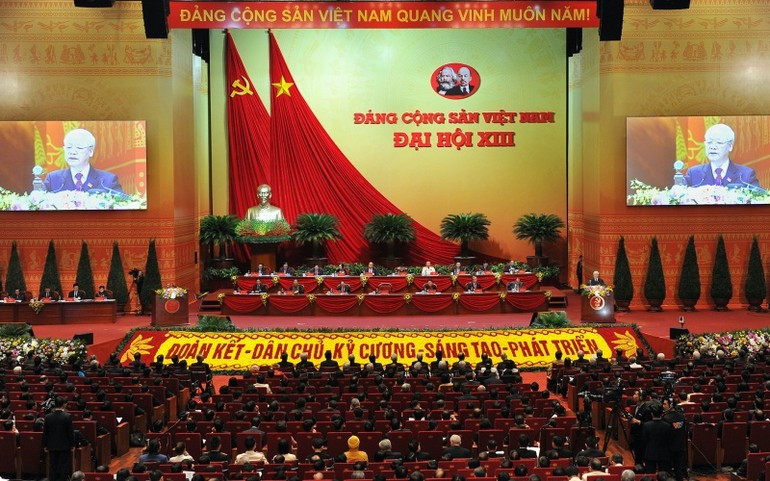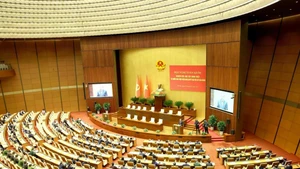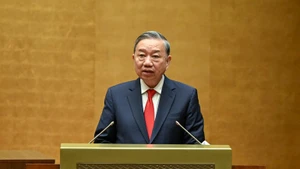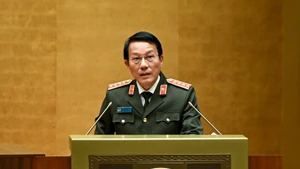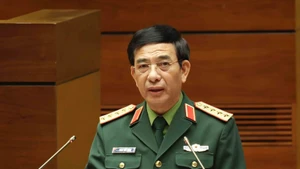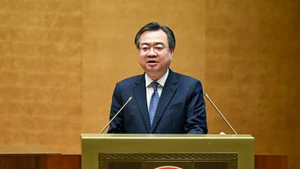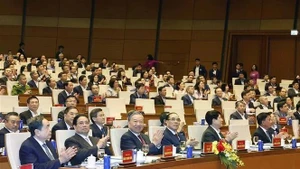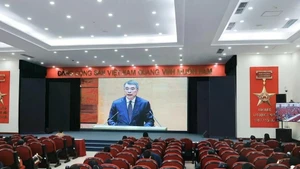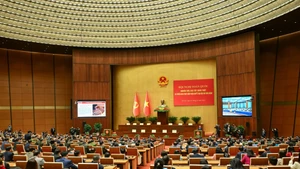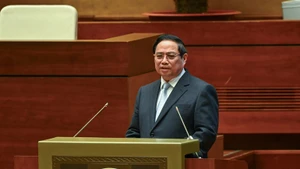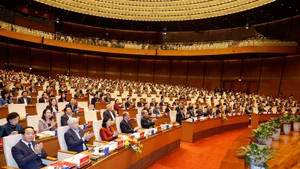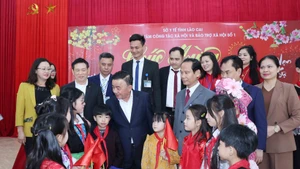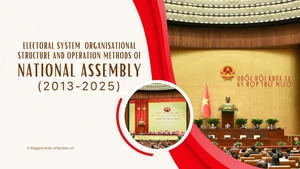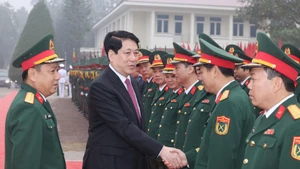General Secretary Nguyen Phu Trong (April 14, 1944 – July 19, 2024)
General Secretary To Lam
The theme of the congress was “Strengthening the building and rectification of the Party and the political system to be pure and strong; arousing aspirations for national development, promoting the will and strength of the great national unity in combination with the strength of the times; continuing to comprehensively and synchronously accelerate the renewal process; firmly building and defending the Fatherland, maintaining a peaceful and stable environment; and striving for our country to become a developed nation oriented towards socialism by the middle of the 21st century.”
With the spirit of “Solidarity – Democracy – Discipline – Creativity – Development”, the congress reviewed the implementation of the Resolution of the 12th National Congress, linked with the assessment of 35 years of Doi Moi (renewal), 30 years of implementing the 1991 platform, 10 years of implementing the 2011 supplemented and developed platform, and the 2011–2020 Socio-Economic Development Strategy. It also outlined directions and tasks for socio-economic development for the 2021–2025 period, determined goals and orientations to 2030, and set a national development vision to 2045.
General Objectives for the 2021–2026 Tenure: To enhance the leadership, governance capacity, and combat strength of the Party; to build a pure, strong, comprehensive Party and political system; to consolidate and strengthen the people’s trust in the Party, state, and socialist regime; to arouse aspirations for a prosperous and happy nation; to promote the will and strength of the great national unity in combination with the strength of the times; to comprehensively and synchronously accelerate the renewal process, industrialisation, and modernisation; to firmly build and defend the Fatherland, maintaining peace and stability; and to strive for Viet Nam to become a developed, socialist-oriented country by the mid-21st century.
Specific Objectives for the 2021–2026 Tenure:
- By 2025, marking the 50th anniversary of the complete liberation of the South and national reunification: Viet Nam will become a developing country with modern-oriented industry, surpassing the lower-middle-income level.
- By 2030, marking the 100th founding anniversary of the Communist Party of Viet Nam: Viet Nam will become a developing country with modern industry and upper-middle-income status.
- By 2045, marking the 100th founding anniversary of the Democratic Republic of Viet Nam (now the Socialist Republic of Viet Nam): Viet Nam will become a developed, high-income country.
The congress identified six key tasks: 1. Continue to promote Party building and rectification and build a socialist rule-of-law state with a comprehensive, pure, strong political system. 2. Focus on controlling the Covid-19 pandemic, conducting mass vaccination for the community; restore and develop the socio-economy; vigorously renew the growth model; and restructure the economy. 3. Maintain independence and self-reliance; continue improving the quality and effectiveness of foreign affairs and international integration; and strengthen national defence and security potential. 4. Inspire the aspiration for a prosperous and happy nation and promote Vietnamese cultural values and human strength in national construction, defence, and international integration. 5. Perfect the legal system, mechanisms, and policies to fully promote socialist democracy and the people's right to mastery. 6. Manage and use land and natural resources efficiently; protect and improve the environment; and proactively implement climate change adaptation measures.
The congress also defined three strategic breakthroughs:
Synchronously perfecting development institutions; developing human resources; and building synchronous and modern infrastructure systems.
The congress elected the 13th Party Central Committee, consisting of 180 official members and 20 alternate members. The Central Committee elected the Politburo with 18 members. The Secretariat consisted of certain members of the Politburo assigned to join the Secretariat and five members elected by the Central Committee.
Comrade Nguyen Phu Trong was re-elected as General Secretary.
On July 19, 2024, Comrade Nguyen Phu Trong passed away.
On August 3, 2024, in Ha Noi, the 13th Party Central Committee convened, held democratic discussions, and, with an absolute consensus of 100% of votes, elected Comrade To Lam, Politburo Member and President of the Socialist Republic of Viet Nam, as General Secretary of the 13th Central Committee of the Communist Party of Viet Nam.
At the eighth and ninth plenums, the Party Central Committee additionally elected four members of the Politburo and one member of the Secretariat.
At the Central Committee meeting on August 16, 2024, the committee additionally elected one member of the Politburo and three members of the Secretariat.
At the Central Committee meeting on January 23, 2025, the committee additionally elected one member of the Politburo and one member of the Secretariat.
(Compiled from the documents of the 13th National Party Congress; Nhan Dan Newspaper)
GENERAL CONTEXT
• January 26 – February 1, 2021: The 13th National Congress was held under the motto “Solidarity – Democracy – Discipline – Creativity – Development.”
• 2021–2023: Viet Nam successfully controlled the Covid-19 pandemic and strongly recovered its economy.
• July 19, 2024: General Secretary Nguyen Phu Trong passed away.
• August 3, 2024: Comrade To Lam was elected General Secretary with 100% of votes.
• July 1, 2025: Administrative units nationwide were merged, reducing the total number of provinces/cities from 64 to 34. The two-tier local government model officially came into operation.
• 2021–2025: GDP targeted annual growth of 6.5–7%, with GDP per capita reaching 4,700–5,000 USD.
DOMESTIC SITUATION
The country stands at a crossroads of opportunities and challenges, with numerous new issues emerging that require timely solutions.
After 35 years of Doi Moi and 30 years of implementing the platform for national construction during the transition to socialism, Viet Nam’s position, strength, comprehensive national power, international prestige, and public trust have been greatly enhanced, creating essential conditions for national construction and defence. The country has never enjoyed such a high profile, potential, and international standing as it does today.
However, the four major risks identified by the Party still exist, and in some respects, have become more severe: the risk of economic lag and the middle-income trap remains high; corruption, wastefulness, bureaucracy, and the degradation of political ideology, morality, and lifestyle persist; and the phenomena of “self-evolution” and “self-transformation” within the Party, as well as social contradictions, remains complicated.
Specific targets for 2021–2025: GDP growth rate of 6.5–7% per year; GDP per capita reaching 4,700–5,000 USD; total factor productivity (TFP) contribution reaching 45%; digital economy accounting for 20% of GDP; and urbanisation rate reaching 45%.
INTERNATIONAL SITUATION
The global and regional context has evolved in a rapid, complex, and unpredictable manner.
Globalisation and international integration continue but face growing challenges due to strategic competition among major powers and the rise of extreme nationalism.
The world economy has fallen into a severe crisis and recession, potentially prolonged by the impacts of the Covid-19 pandemic.
The Fourth Industrial Revolution, especially regarding digital technologies, is developing vigorously, creating breakthroughs in multiple fields and bringing both opportunities and challenges to all countries and peoples.
